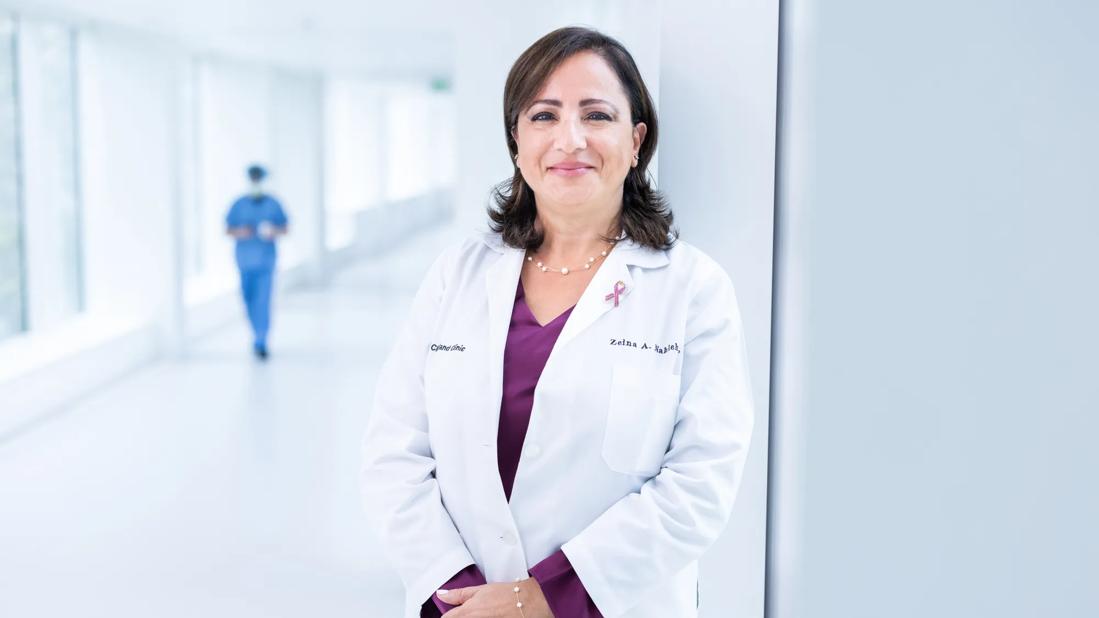
Image content: This image is available to view online.
View image online (https://assets.clevelandclinic.org/transform/55742f1c-d651-4274-a884-4d6628ba64ec/CNR_3874115_04-24-23_3030_AMO-jpg)
Nahleh, MD
An American Society of Clinical Oncology (ASCO) Expert Panel, co-chaired by Maroone Cancer Center Director Zeina Nahleh, MD, at Cleveland Clinic Florida, conducted a review of biosimilar therapeutics for cancer treatment and support. While the Panel’s newly released report supports the inclusion of biosimilars in ASCO clinical practice guidelines, it identifies a number of barriers to their use.
Advertisement
Cleveland Clinic is a non-profit academic medical center. Advertising on our site helps support our mission. We do not endorse non-Cleveland Clinic products or services. Policy
“Unfortunately, many barriers exist regarding biosimilar adoption in terms of awareness, perceptions, and preferences among physicians and commercial payers,” notes Dr. Nahleh. “Hopefully our report will lead oncology specialists and their institutions to look more closely at the options available to patients.”
Equivalent but not identical
Biosimilars are licensed biological products that are highly similar but not identical to FDA-approved reference products. Because biosimilars are produced by living systems, the production and purification processes to create them result in inherent differences. This is the primary distinction between biosimilars and generic drugs, which are instead expected to be identical to brand-name products.
Currently 17 cancer or cancer-related biosimilar products have been approved since 2015, yet variance in the use of oncology biosimilars persists. The ASCO report points to lack of familiarity and understanding of biosimilars and their approval process as a limiting factor in biosimilar prescribing.
Overcoming physician misgivings
Biosimilars are granted approval by the US Food and Drug Administration on the basis of data that demonstrate that they are highly similar to an existing FDA-approved reference product, as well as safe and efficacious. This is generally based on review of a comprehensive data package that includes “critical analytic similarity data, nonclinical data, clinical pharmacology, immunogenicity, clinical efficacy, and safety data,” according to the report.
Advertisement
“To be approved, a biosimilar must exhibit no clinically meaningful differences in terms of safety, purity, and potency,” Dr. Nahleh explains. “However, our literature review shows that many physicians believe the abbreviated FDA approval process, which relies less on randomized clinical trials, and the lower cost for biosimilars compared with reference drugs, are associated with greater risk of side effects and decreased effectiveness. This is absolutely not the case.”
Dr. Nahleh encourages individuals unfamiliar with how biosimilars are developed and the rigorous approval process to read the report, in hopes that it will alleviate some of the misbeliefs.
What is interchangeability?
Another important difference between biosimilars and generic drugs that impacts use is the concept of interchangeability. A pharmacist can easily switch between a brand-name drug and a generic form without notifying a prescriber. That currently is not the case for any of the approved oncology biosimilars. A pharmacist may recommend changing the prescription to a biosimilar product, but the prescribing provider must be notified and approve the substitution.
“There are some FDA guidelines for potentially granting the interchangeable designation, but our panel still recommends prescriber notification,” says Dr. Nahleh, recognizing that this added step may in itself limit biosimilar use.
Regulatory and reimbursement barriers
The Panel’s report also identified a number of regulatory and reimbursement barriers that hamper the use of biosimilars and the potential for cost-savings. They include complex rebate and pricing challenges, patent litigation settlements, and “pay-for-delay” tactics by manufacturers of reference products, in which biosimilar sponsors are paid to delay entry to the market.
Advertisement
“Insurance can also vary substantially in terms of their authorization for certain biosimilars versus others,” adds Dr. Nahleh. “As clinicians, we have to check with the pharmacy and with the insurer to make sure that we are delivering the treatment that is most appropriate for patients based on their insurance.”
To address some of these barriers, the FDA and the US Federal Trade Commission partnered in 2020 to support biosimilar competition and affordability and discourage anticompetitive behavior.
“Price competition will be essential to driving down costs and improving access to effective cancer therapies,” says Dr. Nahleh. “Our panel welcomes efforts to accelerate the safe and widespread adoption of oncology biosimilars.”
Advertisement
Advertisement
Nonthermal technique reduces bleeding and perforation risk
Standardizing a minimally invasive approach for Barrett’s Esophagus and Esophageal Cancer
PSMA-targeted therapy for metastatic prostate cancer now offered at Cleveland Clinic Weston Hospital
Nationally recognized urologic oncologist offers vision for growth, innovation, and excellence
Noninvasive modality gains ground in United States for patients with early-to-moderate disease
Cleveland Clinic Weston Hospital’s collaborative model elevates care for complex lung diseases
Interventional pulmonologists at Cleveland Clinic Indian River Hospital use robotic technology to reach small peripheral lung nodules
Trained in the use of multiple focal therapies for prostate cancer, Dr. Jamil Syed recommends HIFU for certain patients with intermediate-risk prostate cancer, especially individuals with small, well-defined tumors localized to the lateral and posterior regions of the gland.